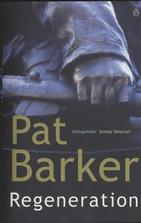
So, accepting that Pat Barker has presented us with a credible First World War psychologist, is his character an asset to the novel?
Of course it’s central if we read Regeneration as the story of the intersection of the lives of two eminent historical figures. But I want a novel with these pretensions to illuminate more than the particular lives on which it shines its light; I want it to tell me something about the human condition. Regeneration certainly delivers in this regard although, for me, it took a second reading to get there. Initially, I was turning the pages out of duty more than pleasure and, with so much dialogue, I wondered if it might work better as a play. Peppered with references to famous and lesser-known historical figures (Edward Carpenter was an interesting surprise to me, but that’s another story), the early chapters had a case-study air about them, yet with rather less of the undercurrent of psychological exploration I’d normally associate with literary fiction. It was almost as if Pat Barker had given all her psychological competence to the character of Rivers, leaving little for her to play with as the author.
The novel really picked up for me once Rivers was away from Craiglockhart and less worn down by his professional responsibilities, and perhaps by his real-life namesake. Although already foreshadowed in the scenes at the hospital, the themes of war and gender and father-son relationships were more fully explored.
As in the war itself, women in this novel are afforded only supplementary roles, but I loved the way that Pat Barker’s feminism would creep in. Rivers comes to realise that war neurosis is not the result of the horrific isolated incidents his patients tell him about, but the enduring strain and helplessness, which he recognises as somewhat akin to women’s experience in peacetime (p222). The notion of the older generation sacrificing the young as, in the Bible, Abraham was prepared to sacrifice Isaac, is not a new one, but it seemed extra poignant in this novel where Rivers was presented as a father figure to his patients who, in turn, although barely out of their teens, were like fathers to the men who served under them.
Pat Barker tackles yet more complex questions when Rivers go to observe another innovative intervention for soldiers with paralysing symptoms with no organic cause. Yealland’s electric shock treatment is conveyed as chillingly as the torture in The Orphan Master’s Son:
You cannot leave the room. The door is locked and the key is in my pocket. You will leave me when you are cured, remember, not before. I have no doubt that you are tired and discouraged, but that is not my fault; the reason is that you do not understand your condition as I do, and the time you have already spent with me is not long in comparison with the time I am prepared to spend with you. (p231)
His journey makes uncomfortable reading, not just for politicians making choices about sending ‘our boys’ to fight, but for anyone engaged in state-funded mental health care. To what extent do participants in the psychiatric system serve to subdue righteous anger by shoehorning troubled individuals into a dubious ‘normality’?
Don’t know about you, but I need a shot of song and dance after that, so I’m flicking through the clips of Richard Attenborough’s moving satire Oh What a Lovely War.
I'll be revisiting Pat Barker's work later in this series, with a look at a contemporary psychologist in Border Crossing. For the next post in this series, I’ll be exploring The Other Side of You by Salley Vickers.





















 RSS Feed
RSS Feed





















